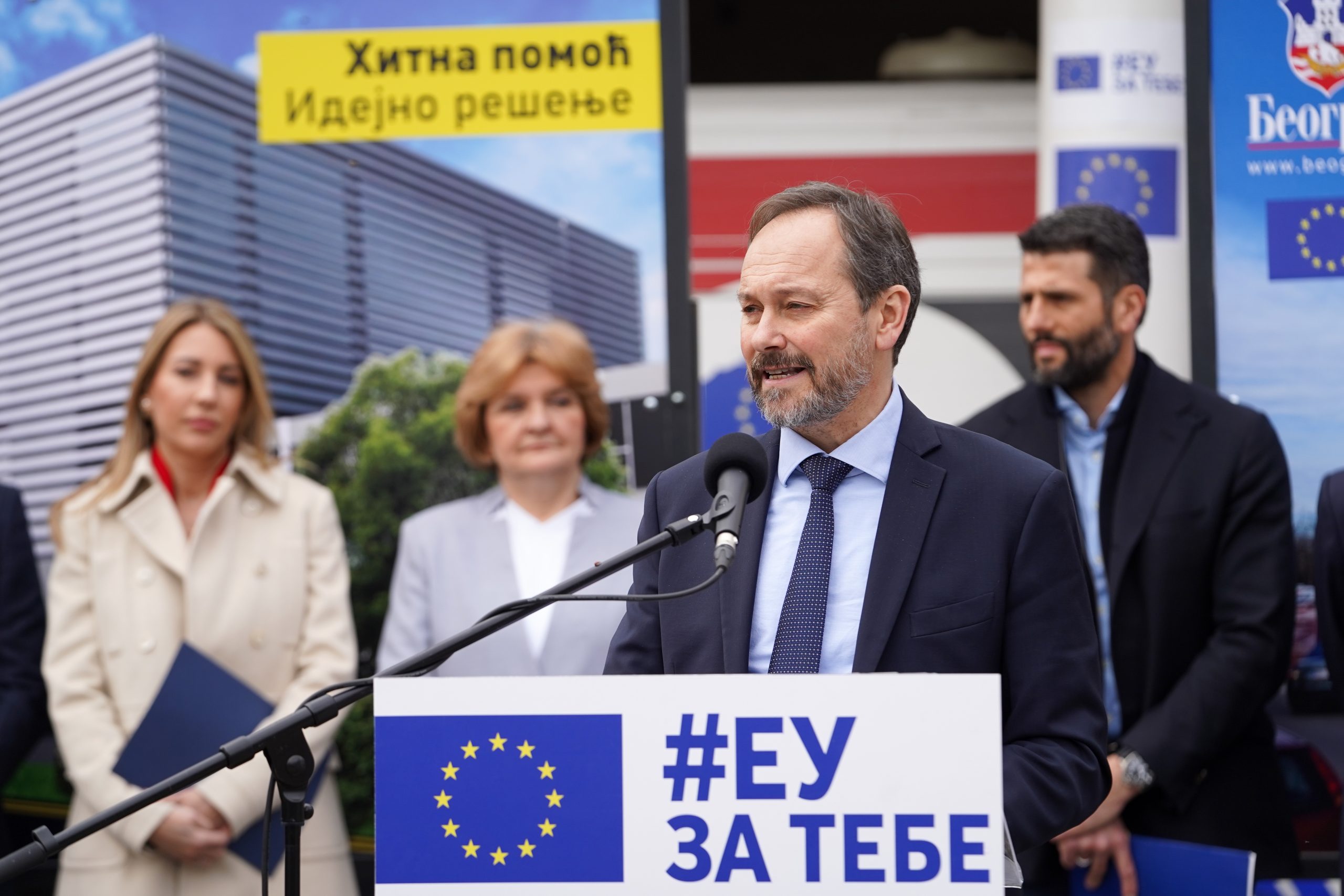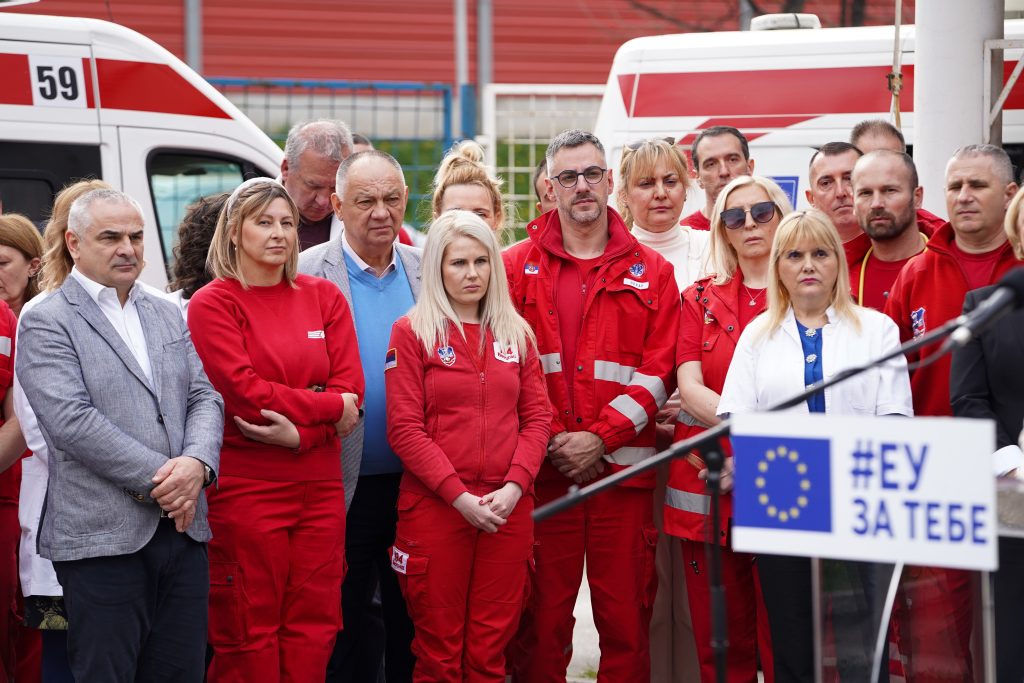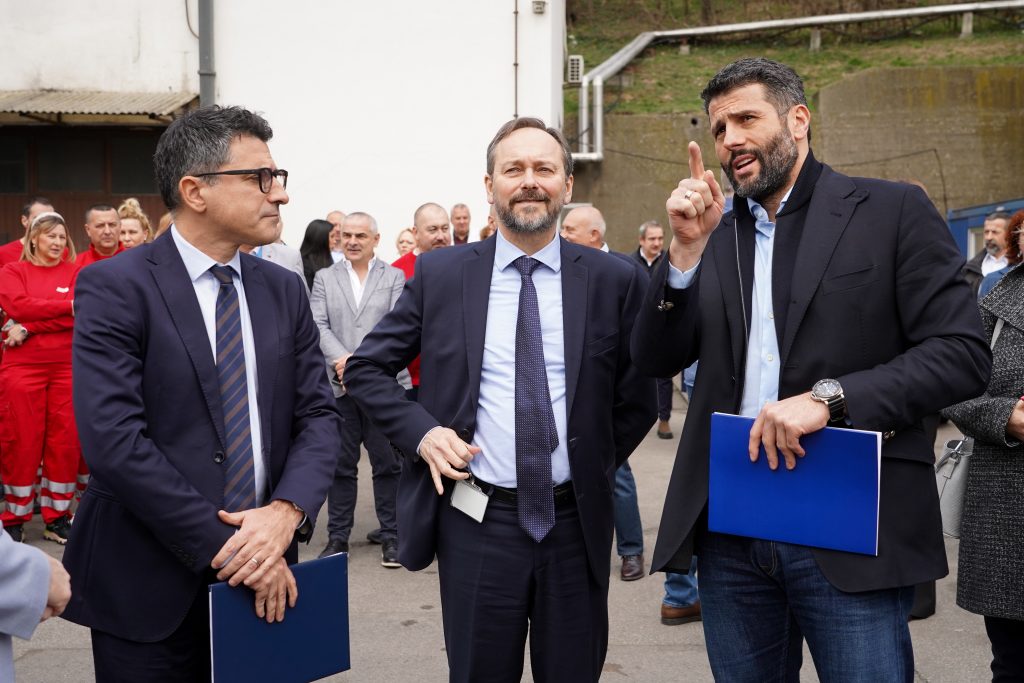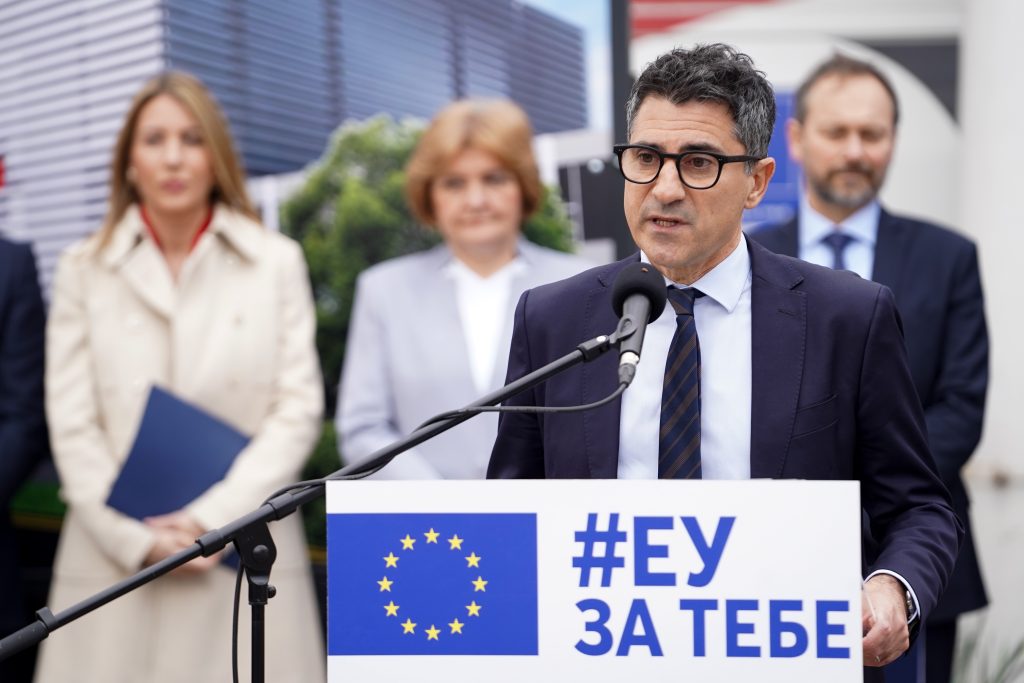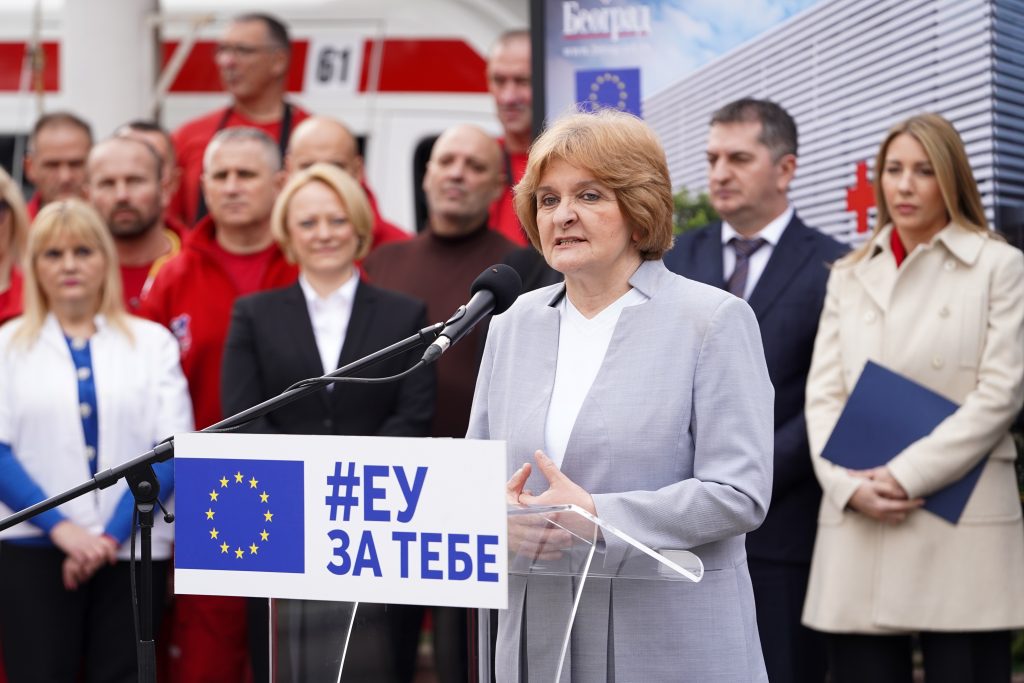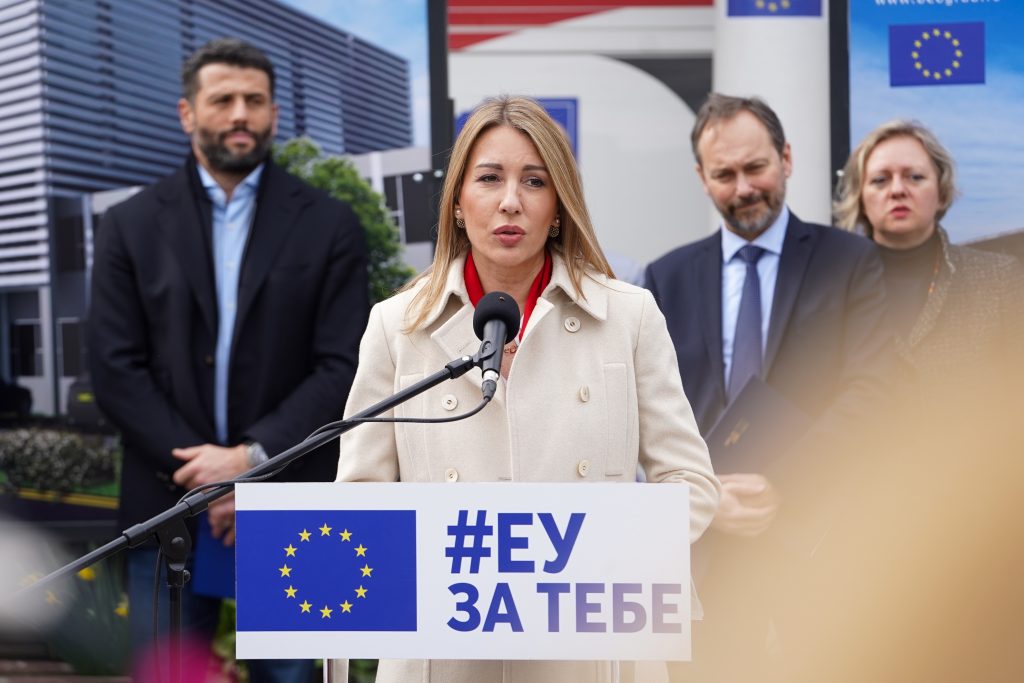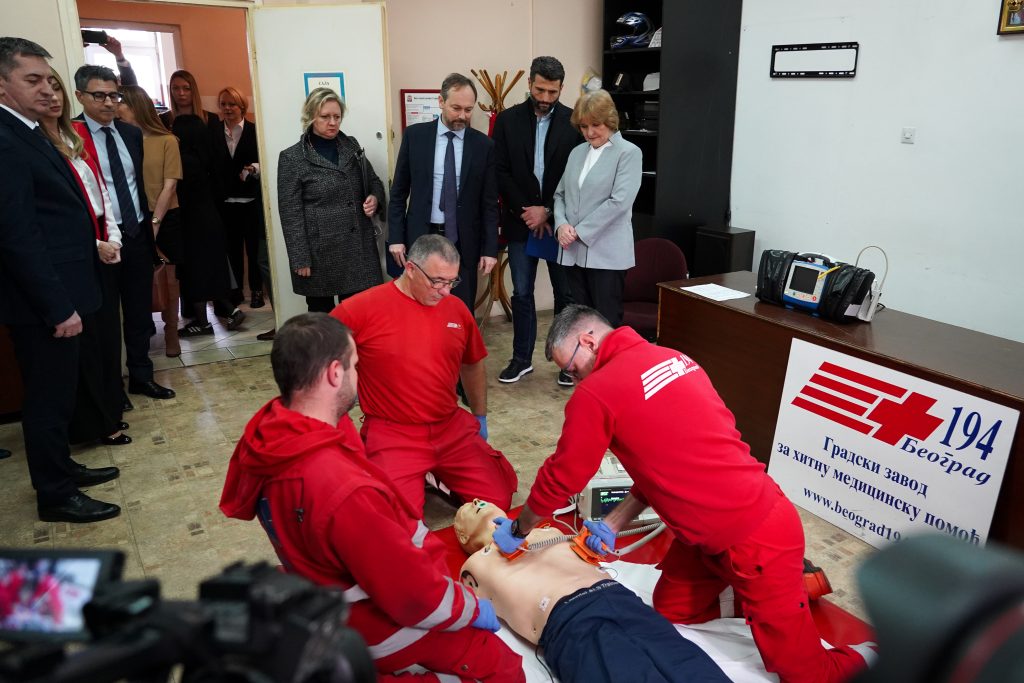In times of urgent need, the efficiency of a modern, well-equipped and comfortable emergency medicine facility cannot be stressed enough. Bringing this key institution to optimal condition is essential for the well-being of all citizens.
Minister of Health, Danica Grujičić, Minister of Mining and Energy, Dubravka Đedović Handanović, President of the Provisional Authority of the City of Belgrade, Aleksandar Šapić, Regional Director of the European Bank for Reconstruction and Development (EBRD) for the Western Balkans, Matteo Colangeli and the EU Ambassador in the Republic of Serbia, Emanuele Giaufret attended the launching of the reconstruction project of the Belgrade Emergency Medical Institute today.
Belgrade Emergency Medical Institute will be reconstructed thanks to a project financed by the European Union (EUR 10 million grant funds) and the European Bank for Reconstruction and Development (EUR 5 million loan).
The Project includes works to improve energy efficiency, as well as the addition and expansion of existing facilities for an additional 8000 m2. Energy efficiency improvement measures include thermal insulation and enhanced heating, ventilation, cooling and lighting systems, which will result in better comfort for users of the facility.
Emanuele Giaufret, Ambassador of the European Union in Serbia, reiterated that there are institutions that we want to avoid, such as hospitals or fire departments, but when we need them, we need them to be in good condition. He said that this Emergency Medicine Institute is responsible for 1.6 million citizens of Belgrade and stated that it is therefore extremely important to keep this facility in excellent condition. He thanked the EBRD for the favourable loan and reminded everyone that the Emergency Medicine Institute had not been reconstructed since 1957.
“We will make the Institute more modern through this project, and we will provide better conditions for the medical staff here. In parallel, we will work on increasing the energy efficiency of the entire building, since the reconstruction will result in energy savings of 50 percent and CO2 savings of 30 percent”, said Giaufret.
Giaufret announced similar reconstruction of the Military-medical Academy (VMA) and reminded that, so far, the EU has donated EUR 1 billion to the Serbian energy sector, and more than EUR 320 million for the healthcare sector.
Regional Director of the European Bank for Reconstruction and Development (EBRD) for the Western Balkans, Matteo Colangeli, expressed his satisfaction with the partnership with the EU in financing this important project, which will provide the citizens of Belgrade with a significant expanded, modernized and energy-efficient emergency institute.
“At EBRD, we are preparing a range of new projects worth over EUR 200 million in the energy efficiency sector including working closely with central and local governments on public buildings, as well as with district heating companies on multi-apartment blocks connected to the network. For individual households, we are making available credit lines through local banks which also benefit from EU grant incentives”, said Colangeli.
The Minister of Health, Danica Grujičić, stated that she is very pleased when old medical facilities are reconstructed. She pointed out that this will enable her colleagues, doctors, nurses, and technicians who maintain vehicles to be able to work in better conditions. She stated that the availability to receive calls will increase to over 30, which will enable a better response from doctors who are in contact with patients.
The Minister of Mining and Energy, Dubravka Đedović Handanović, emphasized that energy rehabilitation of public buildings is a priority of the Ministry and the Government.
“In the previous two years, the Ministry of Mining and Energy started and completed the energy rehabilitation of more than 30 schools, kindergartens, health centres throughout Serbia, with investments of 1,1 billion dinars, between the Ministry and the LSGs, which improved the living conditions of thousands of students and teachers, doctors and patients. At the same time, the financial costs of these institutions have been reduced in the long term and we have made an even greater contribution to environmental protection”, said Đedović Handanović.
The President of the Provisional Authority of the City of Belgrade, Aleksandar Šapić, emphasized the importance of this investment and announced that the works should formally begin in one month.
“In two years, we will have a facility that meets certain conditions, the kind that the City of Belgrade deserves”, said Šapić and stated that the employees of the Belgrade Emergency Medicine Institute will thus be able to work in better conditions.
The City of Belgrade Emergency Medical Institute (CBEMI) is located near highway E75 passing through Belgrade, close to the “Mostar” road junction. It consists of three blocks, A, B and C that were built in 1957 (Block C was built in 1970). The facility covers around 4,000 m2 of surface area and has not been renovated until now. The main purpose of the facility is to provide urgent medical help, covering more than 1 600 000 citizens living in 11 municipalities of the City of Belgrade, over an area of around 1 500 km2. The CBEMI provides almost 1 million health services annually.
EU support to the Energy and Health sectors of Serbia:
The European Union is the biggest donor of the energy sector in Serbia, with investments exceeding EUR 1 billion in grant funds since 2000. The EU is funding projects in Serbia that aim at security of supply, diversification of energy sources, market liberalization and improved energy efficiency. The EU is currently supporting renovation of the biggest hospital in Serbia and in the region – the VMA hospital, as well as construction of the Tiršova 2 hospital.
The donations from the European Union to healthcare in Serbia amount to more than EUR 320 million, and the European Investment Bank (EIB) has provided an additional EUR 250 million in preferential loans, from 2000 to the present day. During the COVID-19 pandemic, the EU has allocated EUR 77 million for the healthcare system in Serbia.
Read more:
https://europa.rs/zasto-je-vazna-energetska-efikasnost-zgrada/
https://europa.rs/modernizacija-hitne-pomoci-u-beogradu-uz-podrsku-eu/
https://europa.rs/nova-oprema-za-transfuziju-u-bolnicama-sirom-srbije/
Više o pomoći EU zdravstvenom sistemu Srbije
Više o projektima i podršci EU sektoru energetike Srbije
Detaljne informacije o projektu

